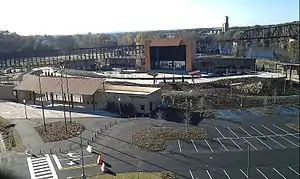 The venue seen from the nearby bridge (c. 2010) | |
| Address | 2710 Jack Warner Pkwy Tuscaloosa, AL 35401-1023 |
|---|---|
| Owner | City of Tuscaloosa |
| Operator | Red Mountain Entertainment |
| Capacity | 7,470 |
| Construction | |
| Broke ground | July 14, 2009[1] |
| Opened | April 1, 2011[2] |
| Construction cost | $14.9 million ($20.3 million in 2022 dollars[3]) |
| Architect | Davis Architects |
| Project manager | HPM |
| Structural engineer | Neel-Schaffer |
| Services engineer | Hyde Engineering |
| General contractor | Harrison Construction |
| Website | |
| Venue Website | |
The Tuscaloosa Amphitheater is an outdoor amphitheater in Tuscaloosa, Alabama, USA that is used primarily for music performances. It has a seating capacity of 7,470.[4]
The amphitheater is located on Jack Warner Parkway, just beside the Hugh R. Thomas Bridge, only minutes away from the University of Alabama campus and blocks from downtown Tuscaloosa. It is the largest outdoor theater in West Alabama.
History
The Tuscaloosa Amphitheater, designed by Davis Architects and built by Harrison Construction, broke ground on July 14, 2009, with an opening date estimated for August 2010.[1] In the next few months, the Tuscaloosa area experienced record rainfall, delaying the opening until 2011.[5]
Kenny Chesney, along with Uncle Kracker, were originally set to open the amphitheater with a concert on March 31, 2011, but scheduling conflicts led to the show being moved back to May 25.[6] It was later announced that The Avett Brothers and Band of Horses would open the amphitheater on April 1, 2011, followed by Patti LaBelle and The O'Jays the next night.[7]
See also
References
- 1 2 Hughes-Cobb, Mark (July 15, 2009). "Officials break ground on amphitheater". The Tuscaloosa News. The New York Times Company. Archived from the original on February 4, 2013. Retrieved April 12, 2011.
- ↑ Hughes-Cobb, Mark (April 2, 2011). "Amphitheater enjoys smooth opening night". The Tuscaloosa News. The New York Times Company. Archived from the original on September 13, 2012. Retrieved April 12, 2011.
- ↑ 1634–1699: McCusker, J. J. (1997). How Much Is That in Real Money? A Historical Price Index for Use as a Deflator of Money Values in the Economy of the United States: Addenda et Corrigenda (PDF). American Antiquarian Society. 1700–1799: McCusker, J. J. (1992). How Much Is That in Real Money? A Historical Price Index for Use as a Deflator of Money Values in the Economy of the United States (PDF). American Antiquarian Society. 1800–present: Federal Reserve Bank of Minneapolis. "Consumer Price Index (estimate) 1800–". Retrieved May 28, 2023.
- ↑ Bratina, Anthony (March 29, 2011). "A look inside the new Tuscaloosa Amphitheater". The Tuscaloosa News. The New York Times Company. Archived from the original on February 17, 2020. Retrieved February 16, 2020.
- ↑ DeWitt, Robert (January 20, 2010). "Amphitheater may not open in September as planned". The Tuscaloosa News. The New York Times Company. Archived from the original on September 18, 2012. Retrieved April 12, 2011.
- ↑ "Date of Chesney show moved back". The Tuscaloosa News. The New York Times Company. January 15, 2011. Archived from the original on February 5, 2013. Retrieved April 12, 2011.
- ↑ Hughes-Cobb, Mark (February 1, 2011). "Amp plans two-night opening weekend". The Tuscaloosa News. The New York Times Company. Archived from the original on February 5, 2013. Retrieved April 12, 2011.